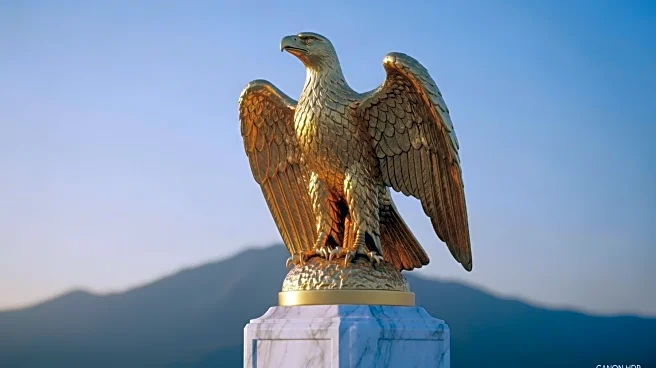What's Happening?
President Trump has shifted his admiration from Andrew Jackson to William McKinley, reflecting a change in his economic priorities. Initially, Trump admired Jackson for his populist approach, which aligned with Trump's first-term focus on challenging elites. However, in his second term, Trump has embraced McKinley, known for his support of tariffs and American expansionism. This shift indicates Trump's increased focus on tariffs as a tool to reshape the U.S. economic landscape. Trump has praised McKinley as a 'natural businessman' and has implemented policies reminiscent of McKinley's era, such as restoring the name of North America's tallest peak to Mount McKinley and imposing tariffs similar to those seen during the McKinley Tariff Act of 1890.
Why It's Important?
The shift in Trump's presidential admiration highlights a significant change in his economic strategy, with potential implications for U.S. trade relations and domestic economic policy. By focusing on tariffs, Trump aims to protect American industries and negotiate more favorable trade deals. This approach could lead to trade tensions and impact global economic stability. Trump's alignment with McKinley's policies suggests a move towards protectionism, which may affect U.S. exporters and consumers through increased prices. The emphasis on tariffs also reflects Trump's broader goal of prioritizing U.S. interests over global trade agreements, potentially reshaping international economic dynamics.
What's Next?
Trump's focus on tariffs and protectionism may lead to further trade negotiations and potential conflicts with international trading partners. The administration's economic policies could face challenges from industries affected by tariffs and from political opponents who advocate for free trade. As Trump continues to implement McKinley-inspired policies, stakeholders in the U.S. and abroad will likely monitor the impact on economic growth and international relations. The administration may also face legal and political challenges as it seeks to expand executive power in economic matters.
Beyond the Headlines
Trump's admiration for McKinley and focus on tariffs may have deeper implications for U.S. political and economic identity. The shift from Jackson to McKinley reflects a move from populism to protectionism, which could influence the Republican Party's platform and voter base. The emphasis on tariffs may also affect the U.S.'s role in global economic leadership, as it challenges the principles of free trade and international cooperation. This development could lead to long-term shifts in U.S. economic policy and its relationship with global partners.










